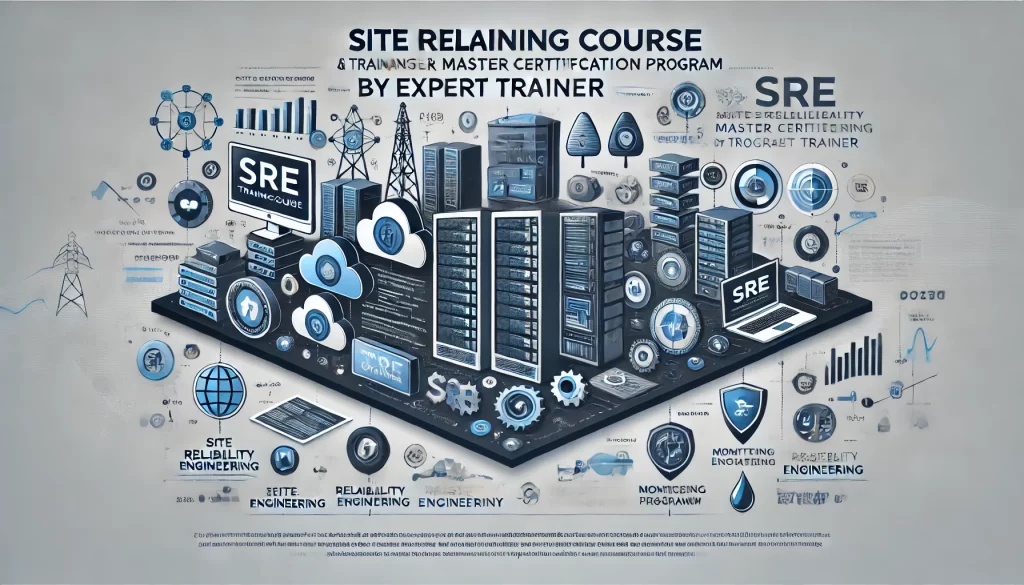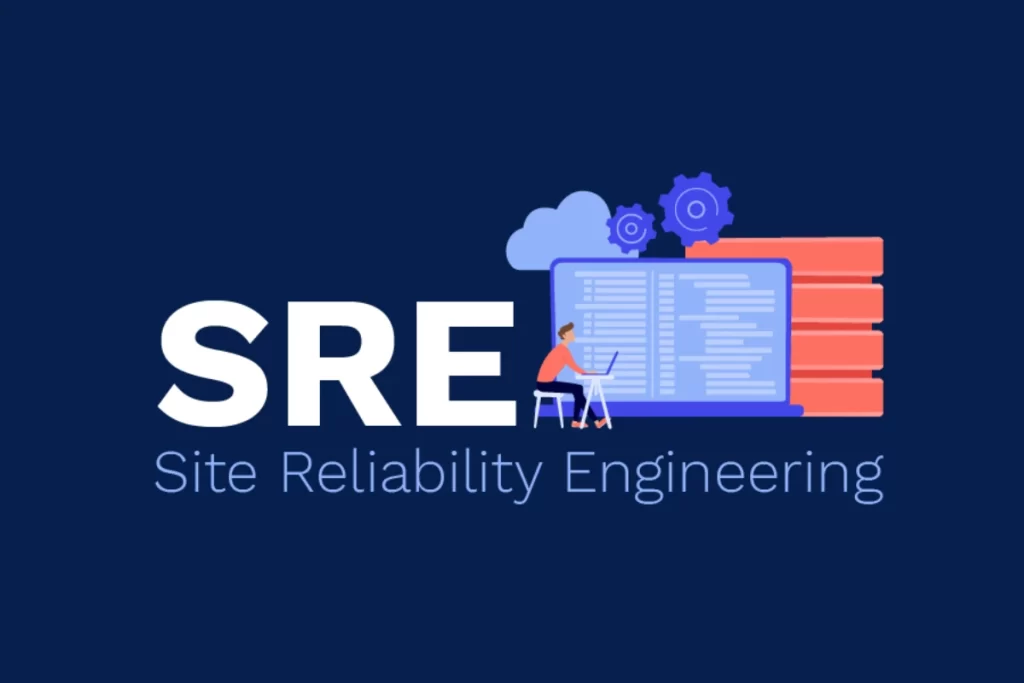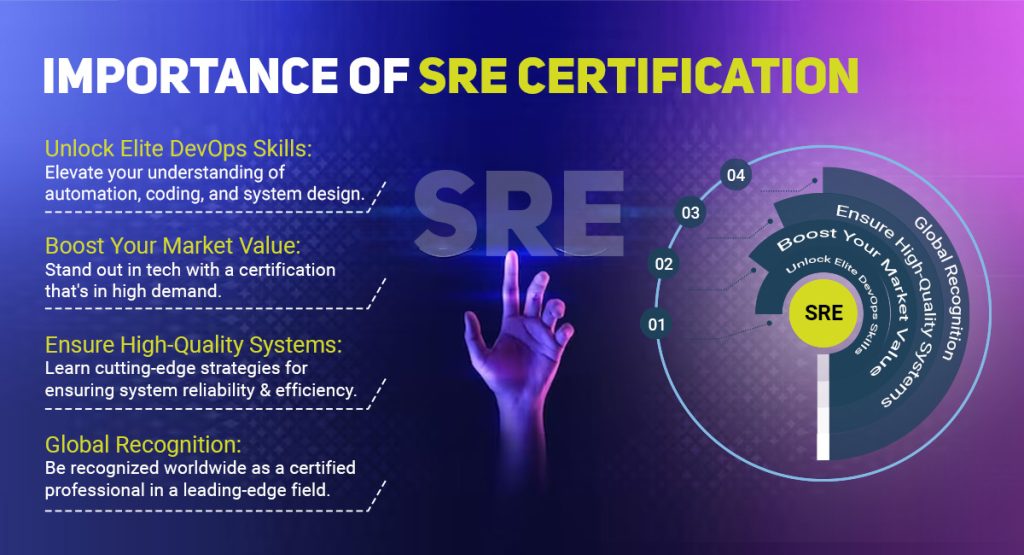
What is SRE?

Site Reliability Engineering (SRE) is a modern engineering approach introduced by Google to ensure high system reliability and performance through automation and standardization. SRE practitioners are responsible for maintaining the balance between releasing new features and ensuring that services are available and reliable for users. This course goes beyond just theory, diving into the core tools and practices necessary for SRE, including:
- Monitoring and Observability: Real-time monitoring tools, like Prometheus for metric tracking and Grafana for visualizing data, allow SREs to set up and manage dashboards, create alerting systems, and understand service health at a glance. Participants will also use the ELK Stack (Elasticsearch, Logstash, Kibana) for centralized logging, enabling advanced log analysis and error detection.
- Incident and Alert Management: With tools like PagerDuty and OpsGenie, SREs can manage incidents more effectively, establish escalation policies, and automate notifications, ensuring that critical alerts reach the right person promptly.
- Automation and CI/CD: The course covers Ansible for configuration management and Terraform for infrastructure as code (IaC), making it easy to set up, tear down, and update complex infrastructures. Jenkins is also introduced for CI/CD, allowing teams to automate the entire build-test-deploy pipeline.
- Version Control and Collaboration: Using GitHub as a central repository for all code changes, participants will learn about version control, branching strategies, and collaboration for improved teamwork and accountability.
Why is SRE Important?

SRE has become an essential part of modern IT and DevOps for numerous reasons:
- Reliability as a Key Metric: In an era where digital services are constantly accessed by users, reliability is crucial. SRE practices help organizations maintain consistent uptime and reduce the impact of outages by proactively addressing risks.
- Improved Incident Response and Reduced Downtime: With a strong focus on monitoring, alerting, and automation, SRE ensures that incidents are detected, diagnosed, and resolved quickly, reducing Mean Time to Detection (MTTD) and Mean Time to Resolution (MTTR).
- Better Alignment of Dev and Ops Goals: Through concepts like error budgets, SRE brings a balance between rapid feature delivery and maintaining system stability, aligning development goals with operational reliability.
- Automation for Operational Efficiency: By automating repetitive tasks, SRE frees up engineers’ time, allowing them to focus on strategic improvements rather than firefighting routine issues.
- Career Advancement: Professionals with SRE skills are in high demand across industries. From tech giants to startups, companies are seeking engineers who can manage and scale complex infrastructure while minimizing downtime and improving system resilience.
Course Features
This comprehensive SRE training program includes the following features, designed to offer a blend of theory and practice:
- Intensive Hands-On Labs: Participants gain direct experience with key tools in real-world environments, practicing scenarios that require critical thinking and problem-solving.
- Interactive and Dynamic Learning: The course combines live, instructor-led lectures with group discussions, ensuring every participant understands core concepts and how to apply them.
- Real-World Case Studies: The course includes real incident case studies where participants learn to manage, troubleshoot, and resolve issues as they would in an actual job setting.
- Detailed Resources and Documentation: Access to comprehensive course materials, tool documentation, and practice exercises provides participants with resources they can use both during and after the training.
- Industry-Recognized Certification: Upon completion, participants receive an SRE Certification from DevOpsSchool.com, a validation of their skills and knowledge recognized across industries.
Training Objectives
This training program has clearly defined objectives, ensuring that participants achieve the necessary skills to excel in SRE roles:
- Master Core SRE Tools: Become proficient in the tools used daily by SREs, including Prometheus, Grafana, PagerDuty, Jenkins, and Terraform.
- Understand and Apply SRE Principles: Gain a foundational understanding of reliability engineering, covering core SRE concepts like SLIs, SLOs, error budgets, and the incident lifecycle.
- Design and Manage Monitoring Systems: Learn to configure and maintain robust monitoring solutions that provide actionable insights into system health.
- Implement Incident Response and Automation: Develop workflows for incident response, including alerting and automation, to reduce time spent on manual tasks.
- Establish and Enforce Error Budgets: Set up error budgets to manage the balance between innovation and reliability, a crucial aspect of modern engineering culture.
- Hands-On Practice in Scaling Infrastructure: Learn to manage infrastructure as code and implement solutions that allow for scalability and high availability.
Target Audience
This course is designed for professionals looking to advance in or transition to reliability engineering, DevOps, or IT operations:
- Experienced DevOps Engineers and System Administrators: Engineers aiming to deepen their understanding of reliability practices and add SRE tools to their skillset.
- IT Operations and Infrastructure Engineers: Professionals responsible for the upkeep and scaling of IT infrastructure, looking to introduce SRE practices in their work.
- Software Engineers and Developers: Developers interested in gaining a greater understanding of operational considerations for the applications they develop.
- Technical Leaders and IT Managers: Leaders who want to implement or manage SRE practices within their teams, or are responsible for the reliability of complex infrastructures.
Training Methodology
This SRE training program adopts a comprehensive methodology designed to enhance learning outcomes:
- Instructor-led Lectures: Theoretical concepts are taught through lectures with interactive elements, where participants can ask questions and clarify doubts.
- Practical Workshops and Hands-On Labs: Labs allow participants to practice setting up, configuring, and using SRE tools under real-world conditions, giving them practical experience.
- Real-Time Scenario Simulations: Real-world scenarios, such as system outages and scaling issues, are used to simulate incidents, allowing participants to apply what they’ve learned in a controlled environment.
- Group Activities and Discussions: Collaborative activities help participants learn from each other’s experiences and perspectives, reinforcing core principles and strategies.
Certification Program
The SRE Certification issued by DevOpsSchool.com upon course completion is recognized by industry employers and signifies that participants have achieved a standard of excellence in SRE practices. It demonstrates expertise in:
- Practically applying SRE methodologies to real-world situations.
- Understanding and implementing SRE principles.
- Using industry-standard tools to manage reliability and incident response.
- Automating workflows and setting up monitoring and alerting systems.
Agenda for SRE Training
Day 1: Foundations of SRE and Introduction to Monitoring
- Overview of SRE: Concepts of reliability engineering and Google’s SRE model.
- Introduction to Monitoring: Setting up monitoring systems with Prometheus and Grafana.
- Hands-On Labs: Configuring dashboards, creating alerts, and practicing with SLOs and SLIs.
Day 2: Incident Management and Automation Fundamentals
- Incident Response Best Practices: The incident lifecycle, alert routing, and on-call best practices.
- Hands-on with PagerDuty and OpsGenie: Setting up escalation policies and automated alerting.
- Automation with Ansible and CI/CD with Jenkins: Basics of automation for reliable CI/CD pipelines.
- Lab Exercises: Configuring CI/CD pipelines, automation scripts, and incident management workflows.
Day 3: Reliability Engineering and Scaling Infrastructure
- Error Budgeting and SLO Management: Defining SLOs and managing error budgets effectively.
- Infrastructure as Code (IaC) with Terraform: Setting up scalable infrastructure in cloud environments.
- High Availability and Scaling Strategies: Implementing redundancy and auto-scaling for resilience.
- Final Lab: Deploying infrastructure with Terraform, configuring scaling policies, and ensuring high availability.
Lab Setup
To participate in labs, you’ll need:
- Laptop: Ideally with at least 8GB RAM and virtualization enabled.
- Virtual Machine: Ubuntu or CentOS setup for lab environments.
- Cloud Access: AWS or Azure account (trial versions or sandbox environments recommended).
- Pre-installed Tools: Instructions for installing Prometheus, Grafana, Ansible, and Terraform will be provided before training.
Trainer
The course is taught by Rajesh Kumar, a respected DevOps and SRE specialist with 15+ years of experience. Rajesh has trained thousands of professionals in SRE and related disciplines and is known for his practical, insightful training style. Learn more about him at RajeshKumar.xyz.
FAQ
- What is the difference between DevOps and SRE?
DevOps is a culture and set of practices that promote collaboration between development and operations teams, aiming to improve software delivery and deployment frequency. SRE (Site Reliability Engineering), on the other hand, is a specific engineering approach that emphasizes automation, monitoring, and reliability, focusing on maintaining a balance between fast development and system stability. SRE often uses error budgets and SLOs (Service Level Objectives) to define and maintain reliability standards, complementing DevOps practices by introducing reliability as a measurable goal.
2. Which tools will I gain hands-on experience with?
This course covers essential SRE tools, including:
- Prometheus and Grafana for monitoring and visualizing system metrics.
- ELK Stack (Elasticsearch, Logstash, Kibana) for log management and analysis.
- PagerDuty and OpsGenie for incident alerting and response.
- Ansible for configuration management and Terraform for infrastructure as code (IaC).
- Jenkins for CI/CD pipeline automation.
- GitHub for version control and collaboration.
3. Is there any prerequisite for this course?
While no formal prerequisites are required, participants should have basic knowledge of system administration, cloud computing, or DevOps fundamentals. Familiarity with Linux commands and scripting and an understanding of networking concepts will help you get the most out of the training.
4. How is this course delivered (online or in-person)?
The course is delivered online, with live instructor-led sessions. These enable participants to interact with trainers, ask questions in real time, and engage in group discussions. Recorded sessions are also provided, allowing participants to review material at their own pace.
5. What certification will I receive?
Upon completing the course, participants will receive an SRE Certification from DevOpsSchool.com. This certification demonstrates proficiency in SRE principles, tools, and practices and is recognized by industry employers.
6. Are there hands-on labs included?
Yes, the course includes hands-on labs for each major module. These labs allow participants to practice using SRE tools, set up monitoring, configure incident alerting, automate infrastructure, and manage systems in a real-world environment.
7. How are real-world scenarios integrated into the training?
Through case studies and simulated exercises, the course integrates real-world scenarios, such as handling incidents, setting up monitoring for live services, and scaling infrastructure. These scenarios help participants understand how to apply SRE principles and tools in practical situations, preparing them for real challenges they may encounter in their roles.
8. What cloud environments will be used for labs?
Participants will primarily use AWS or Azure for cloud-based lab exercises. Access to these environments, along with guidance on setup, will be provided to help participants deploy, monitor, and manage applications and infrastructure during the training.
9. Is the certification widely recognized?
Yes, the SRE certification from DevOpsSchool.com is recognized across industries as a validation of practical knowledge and skills in Site Reliability Engineering. It can enhance career prospects for those seeking roles in SRE, DevOps, and IT operations.
10. How long will I have access to course materials?
Participants will have lifetime access to course materials, including lecture recordings, lab instructions, resources, and any updated content. This allows participants to revisit the material as needed to reinforce their knowledge and skills.
11. What if I need to miss a session?
If you miss a live session, you can access the recorded lecture at your convenience. Additionally, trainers are available to answer questions or clarify concepts if you need further support.
12. Is this course suitable for beginners?
Yes, this course is structured to accommodate participants with varying levels of experience, from beginners to experienced IT professionals. Beginners will gain foundational knowledge, while experienced participants can deepen their expertise in SRE.
13. What type of support is available during the training?
Participants receive ongoing support from trainers through live Q&A sessions, email, and dedicated discussion forums. Post-training support is also available to assist participants in applying what they’ve learned to real-world scenarios.
14. Can this course help me transition to a DevOps or SRE role?
Absolutely. This course provides a comprehensive understanding of SRE principles, tools, and practices that are highly relevant to DevOps and SRE roles. By completing this training, participants are better equipped to take on reliability-focused roles in DevOps or IT operations.
15. Are there job placement services provided after the course?
While theaiops.com does not offer direct job placement services, we provide career guidance, resume tips, and interview preparation resources to help you leverage your certification and skills in the job market. Many participants find that the SRE certification and hands-on experience gained during the course significantly enhance their job prospects.
